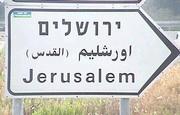Ahavat Chinam -- leave the politics aside
On the second day of yom tov, I attended a beautiful talk by the daughter of one of the rabbis who is part of the program here (who happens to be one of the rabbis affiliated with my shul and school, and one of my teachers in junior high. Irrelevant, though.) She is several years younger than me and made aliyah when she was 18, and her talk was entitled "Direct from Israel." She's vivacious and unpretentious, and she wasn't lecturing so much as sharing her understandings and appealing to ours.
She prefaced by assuring us this was not going to be a speech on why everyone should make aliyah, because she believes that's a truly personal decision, and that the only reason one should decide to move to Israel is if, to that person, the thought of living elsewhere simply cannot be tolerated.
Then she began with a verse-by-verse analysis of L'cha Dodi. I can't repeat the wording precisely here (and in fact I may be inadvertently overinterpreting/overdramatizing) but the theme as I understood it was as follows: First, we call out to the mourners of Israel, those who have lost what is dear to them, and tell them that if they come out to welcome the shabbat kallah, they will be able to rejoice once more. Then we reach out to the poor, and tell them we will provide them with the physical necessities and the ornaments to properly welcome the shabbat kallah, and through the process they will be made rich. Finally, we approach the unaffiliated, the spiritually unconnected, and persuade them to give their energies and attention to the shabbat kallah, and they will discover new meaning in their lives. When all are gathered, we proceed to the gates of the city together, and through each group's encouragement of one another, we all as a nation reach amazing heights.
She used this introduction to lead into her experiences with Israel as a place where, bottom line, the goal is to give to Klal Yisrael. She gave numerous examples of her own experiences with this attitude, and while I'll acknowledge that she's idealistic, I won't discount that kind of perspective because, well...I am too. Her stories were the kind that can give me goosebumps and only serve to reinforce my passion for the country. I won't repeat them here, though; they were only examples that supported her point.
As a climax to this portrayal, she told of sitting with a friend near the kotel and being approached by a red-headed young man. (She interjected her own narration by wondering aloud why she mentioned that he was red-headed, as it's completely irrelevant, but the fact made me able to picture the scene that much more vividly, so I brought it along). He was distraught, in tears, gesturing at the golden dome on Har Habayit, asking "What's that?" She told the story very expressively, showing her audience the pained glances she exchanged with her friend during this interchange.
"Err...uh...that's the mosque."
"But -- but -- where's the Beit Hamikdash?!"
How do they break this to him? But suddenly he understands.
"Oh...wait...I know...how could it be...this is because of sinat chinam, right?"
And they look at each other again, relieved and miserable at once.
"Yes. Yes, it is."
She didn't go into any detail about who he might have been, what might have been "up" with him or what happened after that. But the point was made, that even with all the illustrations she'd given of Jews helping other Jews, it's not enough. We need to work harder.
She insisted she didn't want to get into politics, and she tried. It's pretty impossible when talking about Israel, though, and she did address the evacuations tangentially. It was pretty clear from everything she didn't say how she felt about them -- she corrected all references to "giving back" the land to "giving it away," and she tried to give a picture of the people who live there and just what they will be leaving behind to be destroyed. But she was very careful not to state an opinion on what should or should not be done. She acknowledged that most of the Israeli public supports the move, and it was her attention to the nuances of the situation that stood out in my mind. In fact, she made a statement that I consider to be nothing less than profound:
"[Israeli] politics is like olam haba -- we just don't know." I believe she meant we don't know, at the end of all the arguments and the reasoning, what really should be done. We don't know what will get us to the ultimate success. We don't know exactly what's expected of us or how to implement it. So we keep pushing on, hoping that our understandings are guiding us correctly, realizing that there must only be one "right" path and not wanting to give up our confidence that it is our own, yet also not wanting to entirely cut down anyone else's for fear that theirs is actually the Derech.
May Hashem give us the strength to continue the search and find our way very, very soon.
(Posted on Pacific time)


0 Comments:
Post a Comment
<< Home